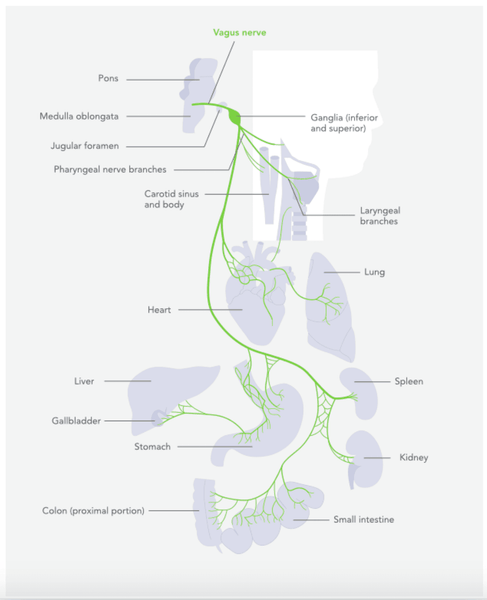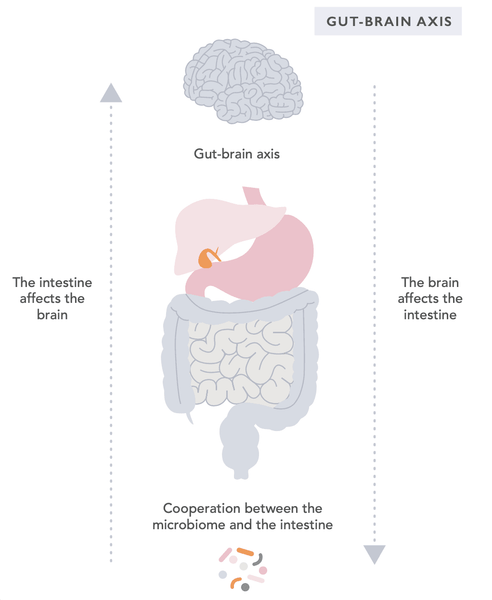The Vagus nerve (the tenth cranial nerve) consists of two distinct nerve branches located on the right and left of the spinal cord. It is the most important and also the longest nerve in the parasympathetic nervous system. In practice, the vagus nerve regulates the function of all the internal organs, including the contraction of the muscles involved in speaking and eating.
Article written by: Inka Immonen
Edited by: Olli Sovijärvi
Introduction
The Vagus nerve is also the body’s key nerve involved in relaxing and resting. That’s why it’s often discussed in the context of stress. As you’ve probably experienced, changes in the environment and your own emotions also change the body’s state of stress. More stress, energy, and activity are fueled by the sympathetic nervous system whereas rest, recovery and relaxation are fueled by the parasympathetic nervous system. That’s why supporting vagal activity can also support overall well-being, mental balance, and recovery - especially if you feel stressed. This article lists ways to naturally stimulate the vagus nerve.
Disclaimer: This article is not intended as medical advice. If you suffer from anxiety, chronic stress or depression, always consult your doctor before trying new lifestyle interventions or supplements.
What is the vagus nerve?
Vagus Nerve is one of the longest nerves in the human body (nerves are bundles of fibers that connect the nervous system with other parts of the body). “Vagus” in Latin means “wandering”. This describes the nature of the vagus nerve well, as it “wanders” around the body encompassing essentially all the vital organs (heart, lungs, gut, swallowing muscles, vocalization muscles, and so on). The Vagus nerve emerges from the brainstem and connects the brain to internal organs.
The vagus nerve has two types of fibers (efferent and afferent) which means the signals in the vagus nerve travel both ways: afferent fibres from the internal organs inform the brain about the state of the organs (body-to-brain signals) whereas efferent fibers from the brain alter the functioning of internal organs and muscles (brain-to-body signals). Thus, the vagus nerve has a central position in reading the bodily state and also regulating the nervous system balance.

The vagus nerve controls inflammation
The vagus nerve is also essential in regulating the immune response. Especially vagal afferent fibres are sensitive to detect inflammatory markers. When the vagus nerve detects pathogens, it informs the brain about them. The brain responds by initiating an anti-inflammatory response by modulating the HPA-axis, hormonal release, and changing immune cell functions. This regulation is called a vagovagal response and it is modulated by the cholinergic anti-inflammatory pathway.
Stimulating the vagus nerve
Research shows that the vagus nerve activity is increased during certain activities (see below). These ways may therefore help you to increase overall wellbeing and emotional stability by balancing the nervous system homeostasis and supporting relaxation.
N.b.This should not be confused with the medical device called Vagus Nerve Stimulator (VNS) that refers to FD-approved surgically placed electric devices that are used to stimulate the vagus nerve in epileptic and depressed patients. There are also non-invasive vagus nerve stimulators that are currently FDA-approved for cluster headaches and migraines.
Consider also this: extreme stress and clinical mood disorders have many underlying reasons that should always be discussed with a doctor.
Cold
Cold exposure (e.g., 50°F or 10°C in one study) might improve vagus nerve activity. This happens when the body begins to adjust to the cold. One study showed that cold exposure increased sympathetic activity, which was blunted after cold acclimation. Parasympathetic activity showed a minor increase in cold, which was enhanced after cold acclimation. The researchers concluded that cold habituation lowers sympathetic activation and causes a shift toward increased parasympathetic activity. Studies show, for example, that placing something cold to the side of the neck (such as a cold thermode) and immersing the face in cold water activates the vagus nerve. Other popular ways to practice cold exposure (though not studied in the context of the vagus nerve) are cold showers, dipping the body in icy water in the winter, or doing cryotherapy for 1-3 minutes.

Ensuring a healthy gut microbiome
You might have heard of the gut-brain axis. Rather than being an actual physical axis, the word refers to an interaction between the functioning of the brain and the gut. The main nerve modulating this interaction is the vagus nerve that reaches from the brain to the intestinal mucosa.

Image: Biohacker’s Handbook.
“The gut-brain link”
The vagus nerve senses the gut metabolites, fatty acids, and hormones produced in the colon (such as serotonin, cholecystokinin, glucagon-like peptide 1, and ghrelin). It constantly transfers information about the condition of the gut to the brain via its afferent nerve fibers. An inflamed gut can lead to the brain initiating a stress response that helps fight the inflammation. As such, improving the gut microbiota and gut health, in general, can support a more relaxed state of the nervous system and general autonomic nervous system balance.
“The brain-gut link”
The efferent fibres (brain-to-body) of the vagus nerve modulate gut activity and immune responses in the gut. Mental stress can attenuate vagus nerve functioning and this affects the GI tract. For example, it might increase intestinal permeability and alter gut microbiota. For example, gut problems such as IBS or IBD are linked tolow vagal activity. Thus stress reduction and stimulating the vagus nerve can also benefit the condition of the gut.
Improve gut microbiota with stress reduction and adding these foods into your diet:
- Probiotics (e.g. Lactobacilli and Bifidobacteria)
- Prebiotics (e.g. chicory root, artichokes, garlic, dandelion, asparagus, and banana)
- Fermented foods (e.g. sauerkraut, kombucha, kimchi, and fermented teas)
- Polyphenols (e.g. dark/raw chocolate, blueberries, broccoli)
- High-fiber foods (berries, psyllium, broccoli, soaked almonds)
Loving-kindness meditation
Experiencing positive social connections can relieve stress. A specific type of meditation called Loving-kindness meditation has been shown to increase heart rate variability (HRV). HRV is used to indirectly measure the activity of the vagus nerve.
During Loving-kindness meditation, you visualize friends, family members, and other humans, and mentally repeat positive wishes to them (such as “may you be safe and happy”). LKM has also been shown to increase positive emotions.
In accordance, Porger’s (2007) polyvagal theory suggests that the vagus nerve is central to the social engagement system as it is also involved in eye gaze, facial expressions, and hearing. In line with this theory, it’s been found that increased vagus nerve activity is associated with increased prosocial behavior.
Try Loving-Kindness meditation by Dr. Emma Seppälä (YouTube)
Non-invasive vagus nerve stimulators
Researchers have explored ways to stimulate the vagus nerve through the skin. For this, they’ve used an electrical device or acupuncture needles placed to the auricular branch of the vagus nerve (ABVN). This branch is located in the external ear. In one study, researchers placed and TENS (Transcutaneous Electrical Nerve Stimulator) device to the inner and outer surface of the participant’s tragus (of the ear) and noticed it to increase the parasympathetic nervous system activity.
Consumer-targeted Sensate is also a vagus nerve stimulator that uses the combination of vibration, sound, and relaxing position to activate the vagus nerve non-invasively.
Singing
Vagus Nerve is connected to vocal cords, the inner ear, and the lungs - all of which are active during singing, chanting, and humming. Thus these also change the activity of the vagus nerve. In one study, ‘OM’ chanting was used to activate participants’ vagus nerve via its auricular branch. It also reduced brain activity in a manner that resembles the brain’s relaxation response.
Deep breathing
As the vagus nerve is connected to the heart and the respiratory organs, changes in breathing rhythm might alter its activity. The vagus nerve is activated naturally during exhalation (or you could say that the vagus nerve controls exhalation) whereas the vagus nerve is less active during inhalation. Thus, especially low mindful breathing with long exhalations is believed to improve the vagal tone. This is referred to as the respiratory vagus nerve stimulation (rVNS).
Summary
- The vagus nerve connects the brain to various internal organs and is the main nerve involved in relaxation and recovery
- Prolonged stress and insufficient relaxation reduces the activity of the vagus nerve and causes imbalances in the nervous system functioning
- The vagus nerve can be activated with cold exposure, such as placing something cold in the side of the neck or immersing the face in cold water might
- Improving gut health supports the vagus nerve functioning through the gut-brain axis
- Stress reduction improves gut health through the brain-gut axis
- Loving-Kindness meditation, singing, and deep breathing activates the vagus nerve
- Non-invasive electric and consumer-targeted devices might help to activate the vagus nerve
How do you keep your vagus nerve in check? Tell us in the comments!





